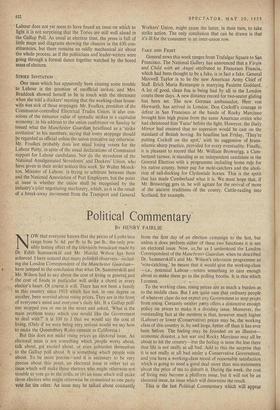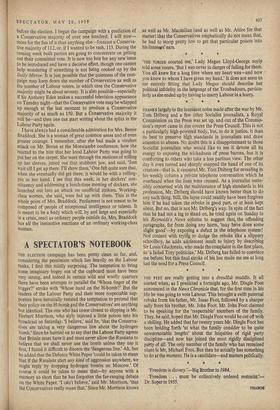Political Conimentary
By HENRY FAIRLIE NOW that everyone knows that the prices of Lyons teas range from 5s 6d. pee lb. to 8s. per lb.: the only pos- sibly lasting effect of dip television broadcast made by Dr. Edith Summerskill and Mr. Harold Wilson has been achieved. 1 have noticed that many politietil observers—includ- ing the London Correspondent of the Manchester Guardian— But this does not make. rising prices an electoral issue. An electoral issue is not something which people worry about, talk about, get excited about. or even unburden themselves to the Gallup poll about. It is something which people vote about. To be more 'precise—and it is necessary to be very precise about this point, an electoral issue is either (a) an issue which will make those electors who, might otherwise not trouble to vote go to the polls. or (b) an issue which will make those electors who might otherwise be committed to one party vote for the other. An issue may be talked about constantly from the first day of an election campaign to the last, but unless it does perform either of these two functions it is not an. electoral issue. Now, as,far as I understood the London Correspondent of the Manchester Guardian, when he described Dr. Summerskill's and Mr. Wilson's television programme as `vote-catching,' he meant that it would give the working-class —i.e., potential Labour—voters something to care enough about to make them go to the polling booths. It is this which I contest.
To the working class. rising prices are as much a burden as to the middle class. But I am quite sure that. ordinary people of whatever class do not expect any Government to stop pri9es from rising. Certainly neither party offers a distinctive enotigh policy on prices to make it a dividing issue. Moreover, the outstanding fact at the moment is that, however much higher (Labour) or lower (Conservative) prices may be. the working class of this country is, by and large. better off than it has ever been before. The feeling may be founded on an illusion— economic disaster, a hot war and Rocky Marciano may all be about to hit the country—but the feeling is none the less there that life is not really at all bad. Add to this the surprise that it is not really at all bad under a Conservative Government, and you have a working-class mood of reasonable satisfaction which is going to need a good deal more than mis-statements about the price of tea to disturb it. During the week, the cost of living may become a platform issue, but it will not be an electoral issue, tin issue which will determine the result.
This is the last Political Cotnmentary which will appear before the election. I began the campaign with a prediction of a Conservative majority of over one hundred. I will now— more for the fun of it than anything else—forecast a Conserva- tive majority of 112, or, if I wanted to be rash, 113. During the coming week both parties are going to concentrate on getting out their committed vote. It is now too late for any new issue to be introduced and have a decisive effect, though one cannot help wondering if something is not being cooked up by the Daily Mirror. It is just possible that the quietness of the cam- paign may keep down the number of Conservative as well as the number of Labour voters, in which case the Conservative majority might be about seventy. It is also possible—especially if Sir Anthony Eden makes a successful television appearance on Tuesday night—that the Conservative vote may be whipped up enough at the last moment to produce a Conservative majority of as much as 150. But a Conservative majority it will be—and then one can start writing about the splits in the Labour Party again.
I have always had a considerable admiration for Mrs. Bessie Braddock. She is a woman of great common sense and of even greater courage. I remember, after she had made a virulent attack on Mr. Bevan at the Morecambe conference, how she reacted to the hint that her local Labour Party was going to put her on the carpet. She went through the motions of rolling up her sleeves, jutted out that stubborn jaw. and said. `Just wait till I get up there. I'll show them.' One felt quite sure that, when she eventually did get there, it would be with a rolling- pin in her hand. I see that this week, in her dockers' con- stituency and addressing a lunch-time meeting of dockers, she launched out into an attack on unofficial strikers. Working- class women, she said, were fed up with them. This is the whole point of Mrs. Braddock. Parliament is not meant to be composed of people of exceptional intelligence or talents. It is meant to be a body which will, by and large and especially in a crisis, react as ordinary people outside do. Mrs. Braddock has all the instinctive reactions of an ordinary working-class woman,











































 Previous page
Previous page